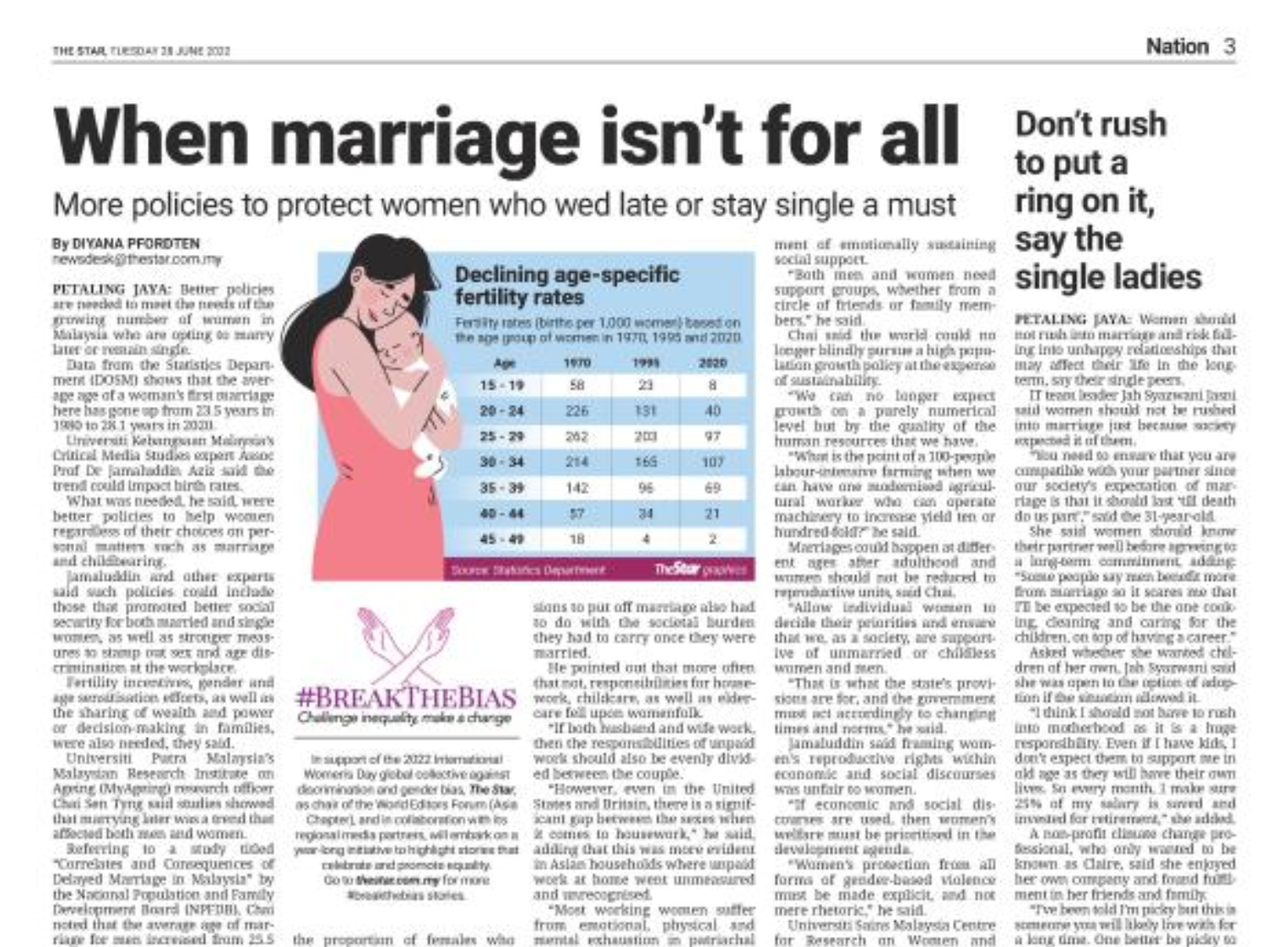To mark World News Day on September 28, 2022, the World News Day campaign is sharing stories that have had a significant social impact. This particular story was shared by The Star (Malaysia).
Better national policies are needed to meet the needs of a growing number of women in Malaysia who are opting to marry later or remain single.
Data from the Statistics Department (DOSM) shows that the average age of a woman’s first marriage here has gone up from 23.5 years in 1980 to 28.1 years in 2020.
Universiti Kebangsaan Malaysia’s Critical Media Studies Assoc Prof Dr Jamaluddin Aziz, said the trend could impact birth rates.
What’s needed, he said, are better policies that help women regardless of their choices on personal matters such as marriage and childbearing.
Jamaluddin and other experts said such policies could include those that promoted better social security for both married and single women, while others include stronger measures to stamp out sex and age discrimination at the workplace.
Fertility incentives, gender and age sensitisation efforts, as well as the sharing of wealth and power or decision making in families are also needed.
Universiti Putra Malaysia’s Malaysian Research Institute on Ageing (MyAgeing) research officer Chai Sen Tyng said studies showed that marrying later was a trend that affected both men and women.
Referring to a study on “Correlates and Consequences of Delayed Marriage in Malaysia” by the National Population and Family Development Board (NPFDB), Chai noted that the average age of marriage for men increased from 25.5 in in 1970 to 28.0 in 2010.
“Unless Malaysian males are marrying foreign brides in big numbers, increase in single females should also be in tandem with increase in single males, especially after considering polygamous unions,” he said.
The mean age of a mother at first birth also increased from 25.6 years in 1990 to 28.0 years in 2020, while the total fertility rate (TFR) has dropped from 4.9 children on average for each woman of child-bearing age in 1970 to 1.7 in 2020.
“What is lesser known is that the age-specific fertility rate has declined too, meaning that successive cohort of women are having less children at older ages,” said Universiti Putra Malaysia’s Malaysian Research Institute on Ageing (MyAgeing) research officer Chai Sen Tyng.
He said although DOSM had yet to release its 2020 social statistics, the proportion of females who never married or were single was expected to be higher at all age groups, compared to the past.
Chai said this trend showed that more men and women are not interested in marriage for reasons ranging from prioritising personal freedom and career, to personality or socioeconomic reasons or just missed opportunities.
The increasing opportunities for tertiary education, he said, had resulted in delayed marriages, which naturally led to delayed childbirth and shorter fertility windows.
“Women today have more choices than marrying, and despite it being a powerful societal norm, an increasing number of women are putting their careers ahead of marriage and childbearing,” he said, adding that women’s decisions to put off marriage had something to do with the societal burden that they had to carry once they were married.
He pointed out that more often than not, the responsibilities for housework, childcare, as well as eldercare, fell upon womenfolk.
“If both husband and wife work, then the responsibilities of unpaid work should also be evenly divided between the couple.
“However, even in the United States and Britain, there is a significant gap between the sexes when it comes to housework,” he said, adding that this is more so in Asian households where unpaid work at home went unmeasured and unrecognised.
“In patriarchal societies, when men consider it beneath them to perform routine household chores, is the real reason why most working women suffer from emotional, physical and mental exhaustion,” he said.
Chai said MyAgeing’s survey had shown that while older men expected their spouses to care for them when they became sick or frail, fewer older women could expect the same of their husband and instead had to rely on adult children, who were mostly daughters or daughters-in-law.
“This is due to the fact that women in general marry older men, and with the life expectancy gap, more women are widows than men who are widowers. Women’s duration of widowhood is also longer,” he said.
He added that men are more inclined to suffer socio-emotionally, as the stereotype of carefree old bachelors impedes the development of emotionally sustaining social support.
“Both men and women need support groups, whether from a circle of friends or family members,” he said.
Chai said the world could no longer blindly pursue a high population growth policy at the expense of sustainability.
“We can no longer expect growth on a purely numerical level but by the quality of human resources that we have.
“What is the point of a 100-people labour-intensive farming when we can have one modernised agricultural worker who can operate machinery to increase yield by tenth or a hundredth fold?” he said.
Marriages could happen at different ages after adulthood, and women should not be reduced into reproductive units, said Chai.
“Allow individual women to decide their priorities and ensure that we as a society, are supportive of unmarried or childless women and men.
“That is what the state’s provisions are for, and the government must act accordingly to changing times and norms,” he said.
Jamaluddin said framing women’s reproductive rights within economic and social discourses was unfair to women.
“If economic and social discourses are used, then women’s welfare must be prioritised in the development agenda.
“Women’s protections from all forms of gender-based violence must be made explicit, and not mere rhetoric,” he said.
USM’s Centre for Research on Women and Gender (Kanita) member Professor Dr Noraida Endut encouraged a better programme for the society on marriage and equality.
She said women who delayed marriage or did not marry might be discouraged by divorce rates and domestic violence within the society.
“We should not view marriage as the main goal for people in society.
“It is an important goal to populate the country but it has to be balanced with better policies on how to ensure better quality of marriages and work life for our citizens,” she said.





